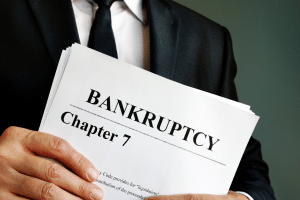This page was written, edited, reviewed & approved by Emil J. Fleysher following our comprehensive editorial guidelines. Emil J. Fleysher, the Founding Partner, has 15+ years of legal experience as a bankruptcy attorney. Our last modified date shows when this page was last reviewed.

Suppose financial setbacks have left you unable to pay your debts, and your creditors have been calling you non-stop. You probably have worries about your future and your family's future. In Florida, debtors who can no longer pay their debts have a relief option by filing Chapter 7 bankruptcy. Chapter 7 bankruptcy can give you the debt relief you need to put it all behind you and start afresh. A Florida Chapter 7 Bankruptcy Attorney can help you make informed decisions and guide you to take actions in your best interest. Florida Chapter 7 Bankruptcy Attorney can ensure that your filing is done correctly with all the documentation. If an issue with your filing occurs, such as a discrepancy in your income reporting, your bankruptcy attorney can help correct it.
At the Law Office of Emil Fleysher, we have a seasoned, well-reviewed Florida Chapter 7 bankruptcy lawyer dedicated to helping Floridians regain their financial freedom when they have been trapped by overwhelming debts that they have little or no prospect of repaying. Our experienced bankruptcy attorney, Emil Fleysher, has successfully filed thousands of bankruptcy cases for clients throughout Palm Beach, Saint Lucie, Broward, Martin, and Indian River Counties.
Contact our Florida bankruptcy law firm at (888) 886-0020 to schedule a free consultation protected by an attorney-client relationship. You can also send an email at emil@fleysherlaw.com or use our online contact form to submit your case details.

Hiring a Florida Bankruptcy Relief Lawyer can help you navigate the complex process, explain your options and what you can expect, and, most importantly, advocate on your behalf. We understand that most people are likely scared and overwhelmed about the bankruptcy process, which is why you need the expertise of our bankruptcy lawyer.
Here's how bankruptcy lawyers can help you:

Two types of bankruptcy options are readily available to people in Florida: Chapter 13 bankruptcy and Chapter 7 bankruptcy. While Chapter 13 is for those debtors who think they can pay back all their debts slowly if allowed to make a fair payment agreement, Chapter 7 bankruptcy can be availed by those who think they can't pay all their current debts at all given their financial situation.
A debtor who decides to undergo the Chapter 7 bankruptcy filing process takes a huge decision that must not be taken lightly. They should fully understand all their financial and legal obligations. In addition, they will have to make major choices, such as which exemptions to file to protect some of their physical assets.
The goal of Chapter 7 bankruptcy is to wipe out the honest but unfortunate debtor's unsecured debts. It can provide debtors with a clean slate by eliminating some of their debts. The entire process for Chapter 7 bankruptcy typically takes 90 to 120 days. At the Law Office of Emil Fleysher, P.A., our attorneys have extensive knowledge and expertise in resolving both basic and difficult bankruptcy cases.
If a debtor qualifies for Chapter 7 bankruptcy, they may be able to receive a discharge for most of their debts. This means that their creditors can't continue to hound them. But, not all debts can be discharged under Chapter 7 bankruptcy.



The U.S. bankruptcy code has set certain income limits and financial asset limits since Chapter 7 is intended only for those who can't afford to pay back all their debts. These limits prevent those debtors with the means to pay back their debts from filing Chapter 7.
If a debtor's income falls below the state's median income level, they do not have to submit the paperwork for the means test. Debtors are also exempted from the means test if their debts are primarily not consumer debt related (i.e., mostly medical debt) or if they are disabled veterans.
If you do not meet the criteria above, you must take the U.S. means test to calculate your average monthly income and expenditures.

There's a difference between who should file and who is allowed to file.
As mentioned above, most debtors who earn under the median income for their state can file for Chapter 7 bankruptcy based on their household size. Those who also pass the means test mandated by bankruptcy laws can file. The means test covers your average monthly household income over the last six months.
If a debtor does not have a job or earns near the minimum wage, they will most likely qualify for filing bankruptcy under Chapter 7. Moreover, debtors who pass the means test can file a Chapter 13 bankruptcy.

Some signs are telling you that you may be a good fit for filing bankruptcy now:

If you have decided to move forward, the following are the steps for filing for Chapter 7 bankruptcy:

Florida has maintained its own set of properties eligible for exemption. To be eligible for property exemptions, you must have officially lived in Florida for the past 730 days or two years. If you have not lived in Florida for the past two years, you must use the state's exemption laws where you officially lived for the majority of the previous 180 days prior to the 730 days.
Florida offers generous homestead exemptions to those property owners who do not live in a municipality. Under Florida Statutes §222.01-02, you can exempt an unlimited amount of home equity if your property is only 160 acres outside municipal zones or not larger than a half-acre in a municipality.
In most circumstances, you can also exempt the following:

The following can be reasons why your Chapter 7 discharge could be denied:
Working with a qualified Florida Chapter 7 bankruptcy attorney can help you avoid making mistakes that may be detrimental to your case. Schedule a free consultation with one of our Florida bankruptcy lawyers.

At Fleysher Law, we are dedicated to diligently and compassionately helping clients resolve their debt problems and get a fresh start through our efficient legal representation. We are a debt relief agency that helps people file bankruptcy relief under the Bankruptcy Code. Whether you live near Deerfield Beach, Lake Worth, Palm Beach, Stuart, or Port Saint Lucie, the Fleysher Law Firm can provide the information you need to formulate and choose a debt resolution strategy that works best for you. Whether utilizing Chapter 7 Bankruptcy, Chapter 13 Bankruptcy, Debt Settlement, Debt Defense, Asset Protection, or a combination, the bankruptcy and debt restructuring team at Fleysher Law will provide the quality, value, professionalism, and responsiveness you need to get a fresh start.
The cost depends on the complexity of your case. It usually costs between $900 and $1500 in attorney’s fees. There is also a mandatory minimum fee of $338 to file for Chapter 7 bankruptcy. You also spend around $50 on a debt counseling course and a personal finance course.
Generally, you don’t have to hire an attorney to file for bankruptcy on your behalf. But since the filing process is quite complex and many factors have to be considered, most bankruptcy filings necessitate the assistance of a Florida Chapter 13 bankruptcy lawyer.
It depends. If you don’t own a home, Florida allows you to exempt up to $5000 in personal property. So if you own a car without a loan and it’s worth less than $5K, this is exempt, and you will keep your vehicle.
It will stay on your credit for ten years. However, your credit score will improve over time if you stay in good standing with any other debts you may accrue following the bankruptcy.
It depends. If you file for Chapter 7 bankruptcy, it will pause the foreclosure proceedings. However, the proceedings will restart after your bankruptcy proceedings are finished. You will likely keep your home if you keep up with payments and remain in good standing with your mortgage company.
A trustee is a person appointed to act on behalf of the court. Their tasks involve:

The decision to file for Chapter 7 bankruptcy is challenging, and the filing process can be overwhelming. Our Florida Chapter 7 bankruptcy attorney can help you with this and will advocate for you to fight for your best interest. We offer $0 down filing and flexible payment plans. Avail of our no-obligation consultation today. Reach us at (888) 886-0020 or send an email at emil@fleysherlaw.com.

https://maps.app.goo.gl/8XPspy5CULpt5Yse9
Read more of our client testimonials here.
Jacksonville, Miami,Tampa, Orlando, Port St. Lucie,St. Petersburg, Cape Coral, Hialeah,Tallahassee,Fort Lauderdale , and surrounding areas.
How much does a lawyer charge for Chapter 7 in Florida?
Fees for legal representation in Chapter 7 bankruptcy proceedings in Florida generally fall between $1,162 and $3,000. However, these expenses are subject to fluctuation. Key determinants of the final cost often comprise the specific chapter of bankruptcy being pursued, such as Chapter 7 or Chapter 13.
How long does Chapter 7 take in Florida?
The Chapter 7 bankruptcy process generally concludes within four to six months after filing. However, this duration is subject to change based on the intricacies of your financial affairs and the court's current schedule.
What assets do you lose in Chapter 7 in Florida?
In the State of Florida, a significant proportion of Chapter 7 bankruptcy petitions are designated as no-asset cases. This categorization signifies that all of the petitioner's property is shielded by exemptions, thus precluding its liquidation for the purpose of debt satisfaction. Accordingly, the majority of individuals who initiate Chapter 7 proceedings within Florida are enabled to maintain ownership of their assets while obtaining discharge of their unsecured liabilities.
What is the income limit for Chapter 7 bankruptcy in Florida?
Eligibility for Chapter 7 bankruptcy is contingent upon meeting specific financial criteria. A means test will be conducted, examining your aggregate monthly income over a sixty-month period (five years). Qualification is established if the total monthly income falls below $7,475. Conversely, income levels exceeding $12,475 disqualify individuals from filing under Chapter 7.
How do I file Chapter 7 with no money in Florida?
The Chapter 7 bankruptcy filing fee is $338, applicable uniformly throughout the United States. Those unable to remit this fee may be eligible for a waiver, contingent upon their income being less than 150% of the federal poverty guidelines.
Can I keep my car if I file Chapter 7 in Florida?
In the context of Chapter 7 bankruptcy proceedings in Florida, a statutory limitation exists regarding the equity value of a vehicle that an individual may retain. The current exemption threshold is established at $1,000. Should an individual's vehicle equity surpass this stipulated amount at the time of filing for Chapter 7 bankruptcy, the aforementioned limitation shall be applicable.
How much is it to file Chapter 7 bankruptcy in Florida?
In the state of Florida, the standard legal fee for representation in a Chapter 7 bankruptcy proceeding is typically between $1,500 and $3,000. It should be noted, however, that attorneys may apply higher fees to cases where the filer's income surpasses the state's median income, necessitating the administration of a means test.
How many times can you file bankruptcy in Florida?
Notwithstanding the possibility of multiple bankruptcy filings within an individual's lifetime, the Bankruptcy Code stipulates defined intervals between cases resulting in debt discharge, so as to mitigate the misuse of legal proceedings.
What is the income cut off for Chapter 7 in Florida?
Effective February 2025, the median income thresholds for single-income families residing in Florida are as delineated below:
Single individual household: $63,916
Two-person household: $78,785
Three-person household: $91,290
What happens after you file for bankruptcy in Florida?
Upon the filing of a bankruptcy petition by a debtor, an automatic stay is immediately imposed. Consequently, creditors are mandated to terminate all collection activities against said debtor, except where authorization to proceed is granted by the bankruptcy court.
Can you lose your house in bankruptcy in Florida?
In the State of Florida, the invocation of bankruptcy proceedings provides safeguards for an individual's assets against creditors, thus preserving property ownership. This represents a significant benefit of pursuing bankruptcy remedies within the jurisdiction.
How does Chapter 7 work in Florida?
In the State of Florida, Chapter 7 bankruptcy proceedings provide a mechanism by which eligible individuals may obtain a discharge of the majority of their outstanding debts. Upon establishing qualification for such proceedings, creditors are legally enjoined from engaging in further collection actions, and the legal obligation to repay specified debts is thereby extinguished.
How much cash is exempt in Chapter 7 Florida?
Florida provides a $1,000 personal property exemption, not including vehicles, which have a separate exemption. Additionally, a $4,000 wildcard exemption can be used for any personal property if the homestead exemption has not been claimed.
Can I keep my house if I file Chapter 7 in Florida?
In order to safeguard home equity during bankruptcy proceedings, the property must have been owned for a minimum of 1,215 days. Provided this condition is fulfilled, there is no cap on the protected value of the residence. Accordingly, the bankruptcy trustee is barred from liquidating the property to procure equity for creditor disbursement.
How fast can you recover from Chapter 7?
Chapter 7 and Chapter 13 are the most common consumer bankruptcies. Chapter 7 discharges most debts, enabling faster credit recovery but stays on credit reports for 10 years.

Emil specializes in consumer bankruptcy, debt settlement, and mortgage modification, offering a holistic approach to solving mortgage and debt problems. Emil listens to clients, understands their circumstances and goals, and helps them make the right choices by presenting all options and contingencies.
He is dedicated to helping South Floridians regain their financial freedom from overwhelming debt caused by high interest credit cards, bad mortgage loans, and uninsured medical expenses.
"*" indicates required fields

"*" indicates required fields